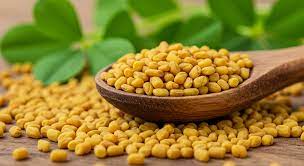Foenegriek, commonly known as fenugreek, is a versatile herb that has been valued for centuries in traditional medicine and culinary practices. This plant is widely used across Asia, the Middle East, and Europe for its seeds and leaves, which are rich in nutrients and bioactive compounds. From supporting digestion to enhancing energy levels, foenegriek has become a popular natural remedy in modern wellness trends. In this article, we will explore the history, benefits, nutritional value, and everyday uses of foenegriek.
The Origin and History of Foenegriek
Foenegriek has a long history that dates back thousands of years. Ancient civilizations like Egypt and Greece valued this herb for its medicinal and culinary purposes. Egyptians used it for digestive issues and as part of embalming practices, while Greeks recognized its ability to improve strength and vitality. Today, continues to play a significant role in Ayurveda, Chinese medicine, and holistic healing systems.
Nutritional Value of Foenegriek
One of the main reasons is so beneficial is its impressive nutritional profile. The seeds and leaves are packed with:
-
Protein: Essential for muscle repair and energy.
-
Fiber: Supports digestion and helps regulate blood sugar.
-
Iron: Crucial for healthy blood circulation.
-
Magnesium & Manganese: Important for bone strength and metabolism.
-
Antioxidants: Protect the body against free radicals.
This nutrient-rich composition makes a valuable addition to a balanced diet.
Health Benefits of Foenegriek
1. Foenegriek for Digestive Health
Foenegriek is well-known for its positive effects on digestion. The seeds are rich in soluble fiber, which helps relieve constipation, reduce bloating, and improve overall gut health. It is also believed to soothe heartburn and acid reflux naturally.
2. Foenegriek and Blood Sugar Regulation
Research suggests that may help in managing blood sugar levels. The fiber slows down the absorption of sugar, preventing sudden spikes and crashes. For people with type 2 diabetes, can be a natural aid alongside medical treatment.
3. Foenegriek for Hormonal Balance
Foenegriek is often used to support women’s health. Traditionally, it has been linked to improving milk production in breastfeeding mothers due to its galactagogue properties. Additionally, some studies suggest that it may help regulate menstrual cycles and ease symptoms of PMS.
4. Foenegriek and Men’s Health
Foenegriek has also gained attention for its role in men’s health. It may help improve testosterone levels naturally, boosting energy, stamina, and even supporting muscle growth when combined with regular exercise.
5. Foenegriek for Weight Management
The fiber content in helps increase feelings of fullness, reducing unnecessary snacking. This makes it a helpful herb for those aiming to manage their weight in a healthy way.
Culinary Uses of Foenegriek
Apart from its medicinal properties, is a favorite in the kitchen. Its seeds and leaves are used in many cuisines for flavor and aroma.
-
Seeds: Commonly added to curries, stews, and spice blends like garam masala.
-
Leaves (Methi): Used fresh or dried in Indian and Middle Eastern dishes.
-
Tea: Foenegriek tea is a popular way to enjoy its digestive and detoxifying benefits.
The slightly bitter yet nutty taste of enhances the depth of flavor in meals.
How to Use Foenegriek in Daily Life
1. Foenegriek Tea
Soaking seeds overnight and boiling them in water creates a soothing tea for digestion and metabolism.
2. Foenegriek Powder
Ground foenegriek seeds can be added to smoothies, soups, or baked goods for a nutritional boost.
3. Foenegriek Supplements
For those who prefer convenience, it is available in capsules and tablets. However, it’s always best to consult a healthcare professional before starting supplements.
4. Foenegriek for Skin and Hair
Foenegriek is also used in natural beauty remedies. Applying foenegriek paste to the scalp may reduce dandruff and promote hair growth, while its antioxidant properties can help rejuvenate the skin.
Precautions and Side Effects of Foenegriek
While it is generally safe, it’s important to use it in moderation. Some people may experience mild side effects such as:
-
Digestive discomfort (gas or bloating)
-
Allergic reactions in sensitive individuals
-
Interaction with medications for blood sugar or blood thinning
Pregnant women should consult their doctor before using foenegriek in supplement form.
Why Foenegriek is Gaining Popularity Worldwide
In the modern wellness industry, is becoming a staple due to its wide range of health benefits. With a growing demand for natural remedies and plant-based nutrition, this ancient herb continues to prove its value in both traditional and scientific contexts. From fitness enthusiasts to those managing chronic conditions, foenegriek is now embraced globally as a versatile health booster.
Conclusion
Foenegriek is more than just an herb; it is a natural powerhouse packed with nutrients and medicinal properties. From improving digestion and balancing hormones to supporting weight management and enhancing overall vitality, offers numerous benefits for both men and women. Whether used in cooking, as tea, or in supplements, this ancient herb has a rightful place in modern health practices. By incorporating into daily life, one can enjoy both flavorful dishes and long-term wellness benefits.

